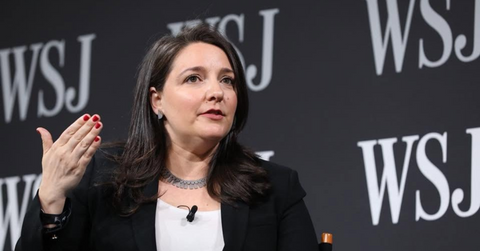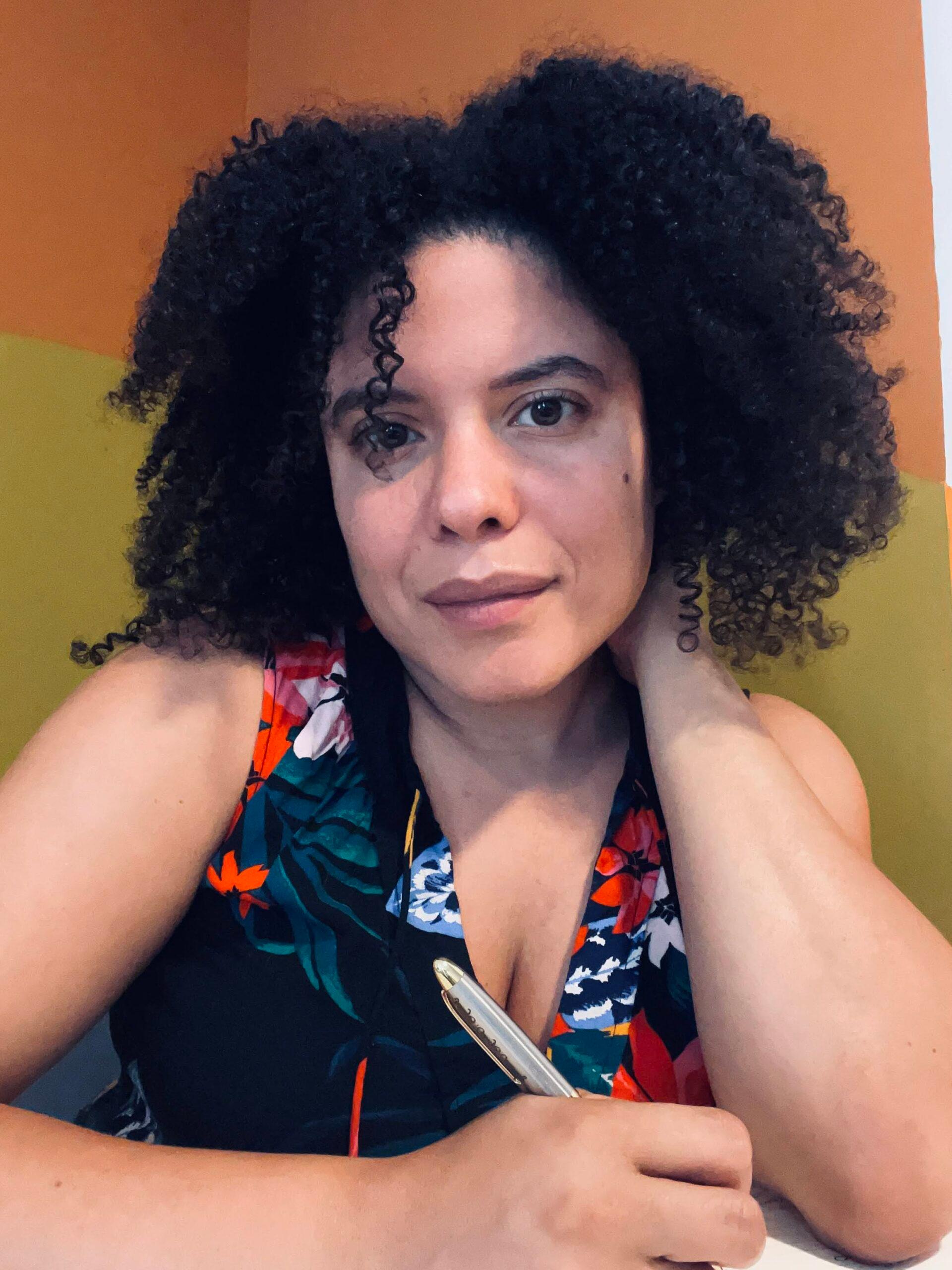Carla Zanoni is a truth seeker. As an award-winning journalist, writer, poet, media strategist, and now head of the Engagement Journalism program at CUNY’s Craig Newmark Graduate School of Journalism, her work has always centered around that pursuit.
“Journalists and poets might define truth differently,” she told us, “But at the end of the day, they’re both looking for answers about human behavior, human emotion, and making sense of what is happening in this world.”
Carla has always wanted to be a writer. In graduate school, she grappled with the decision between pursuing an MFA in poetry and a master’s degree in journalism. Ultimately, she chose journalism. Though she’d been writing poetry since childhood, she was hesitant to call herself a poet— to claim that more vulnerable part of herself.
Years later, while working in the highly structured, professional environment of TheWall Street Journal, she began writing a deeply personal literary memoir. That’s when she realized there was space for all facets of who she is.
“When I’m around people who fully own the darkness and the light of who they are,” she said, “I feel so optimistic and hopeful about what we can accomplish as people, and as a society.”
Her Agenda spoke with Carla about what it means to live and work in authenticity. Here’s what she told us.
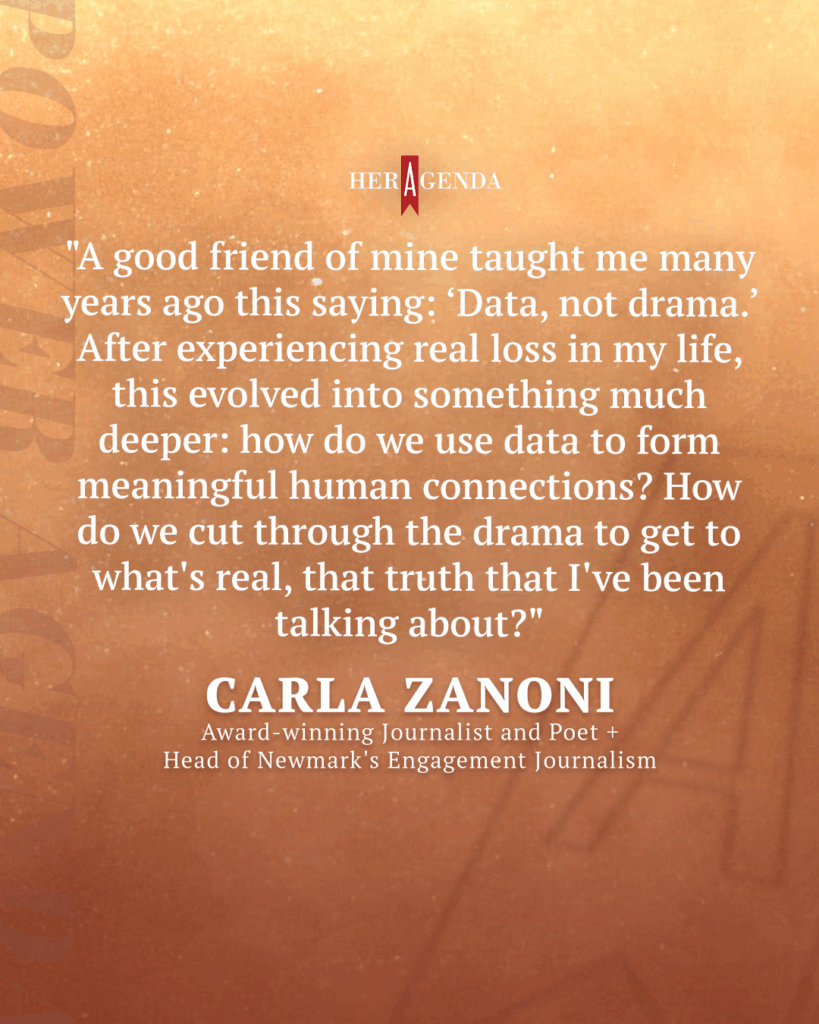
Her Agenda: You’ve described yourself as having a “poet’s heart and a journalist’s brain.” Poetry and Journalism are often seen as opposites, yet your life seems to bridge many such dualities: born in Argentina, raised in New Jersey, now based in New York; both a cat and a dog person. How do you reconcile these contrasts in your writing and sense of identity?
Carla Zanoni: I’ve always been aware that I share a creative brain that thinks in a non-linear manner with an inquisitive, curious brain. For a long time, I thought that was a problem I needed to fix, but then I started to understand that there were great benefits to having this duality.
My brother passed away on January 3rd, 2020, and then COVID hit just a few months later. At that moment, I realized that creativity isn’t separate from professional life; it’s actually what sustains it. The poetry flowing out of me (See her book:Knowing / Saber) allowed me to process that loss while also showing up as a leader, with empathy for what my team, the organization, and the world were going through. That healing informed who I am as a professional and as a creative today. I came to understand that you can’t compartmentalize being human. We try so hard to put ourselves in a box. That keeps us from giving the most that we’re here to give.
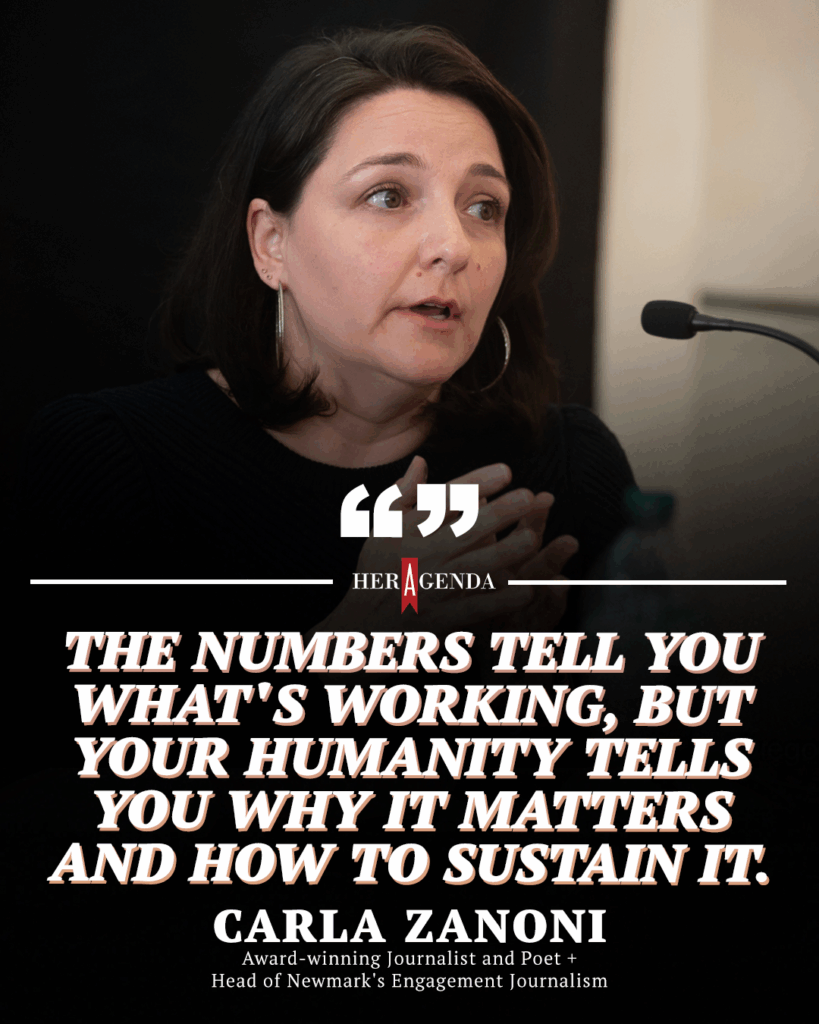
Her Agenda: Your memoir-in-progress explores how what once felt like your greatest mistake became a path to self-love. As an advocate for a post-shame era, what do you think people most need to understand when struggling with self-loathing and forgiveness?
Carla Zanoni: I’ve come to understand that living life in the mold of what others (i.e., society, our families, our friends, the critic that lives in your brain) want from us is a recipe for disaster. It’s so limiting. A lot of what drives that is shame: shame that we’re not enough, that we’ve made mistakes that can’t be forgiven, that we can’t forgive ourselves. Living in that shadow keeps us from the full amazingness of what can be. By telling this story, my hope is that people will take that lesson: that we can experience the darkest things, but it’s coming out into the light that changes everything.
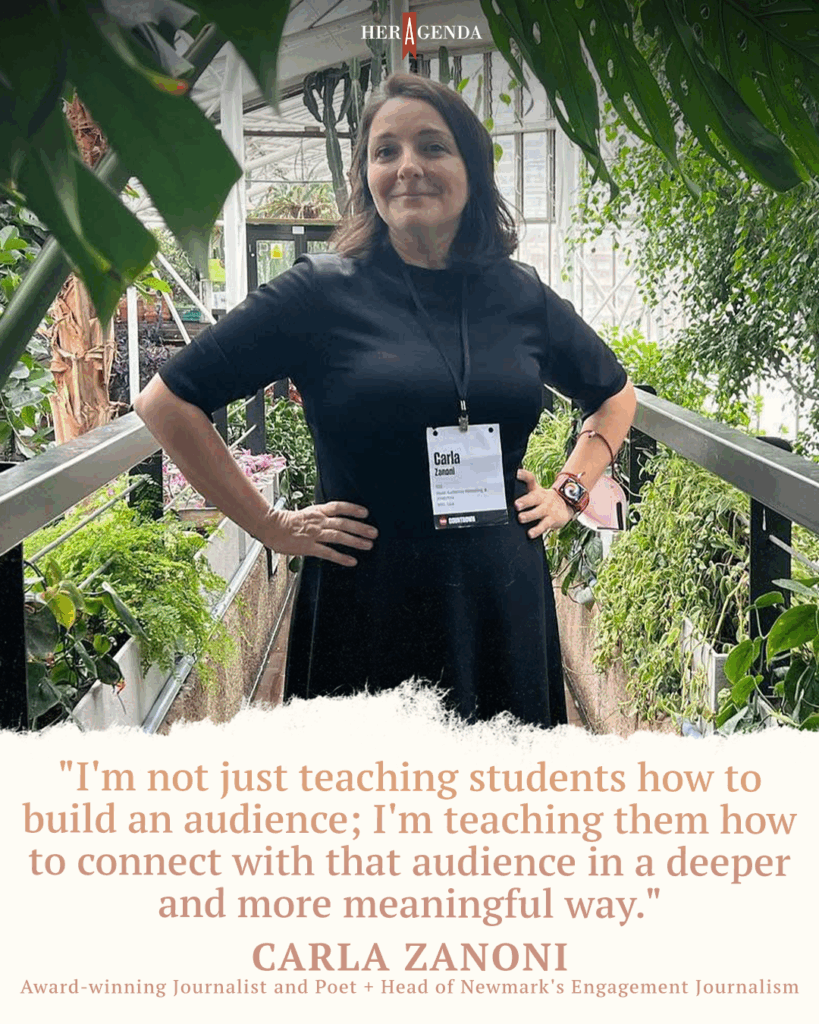
Her Agenda: You’ve been a first many times: The Wall Street Journal’s first global audience and analytics editor, the first Latina to be named to the newspaper’s masthead, and the first head of audience, marketing, and analytics at TED. How have you handled the pressure of breaking new ground in such high-profile spaces?
Carla Zanoni: I am an immigrant, I grew up in an immigrant family, and I don’t come from a place of great privilege, so one of the most important things I needed to do was build a community for myself. That meant being courageous and asking for help, for mentorship.
I started saying yes to different things, even if I didn’t fully understand them and even if I was scared, and that led to a lot of professional opportunities. In the early 2010s, I joined a very impressive women’s networking group, which I credit quite a bit with my career ascent. At the time, I was like: Oh my God, what have I gotten myself into?Like, who am I to be in this group? Fortunately, I had enough support around me to say: You belong there just as much as anybody else.
In addition to support from family and friends, I also have an incredible network of mentors who are women, who are men, who are non-binary, who provide me with lots of different perspectives. We can get into this bubble, so it’s incredibly important for me to have lots of different perspectives to inform my thinking, not just in my immediate industry, but in lots of different industries as well.
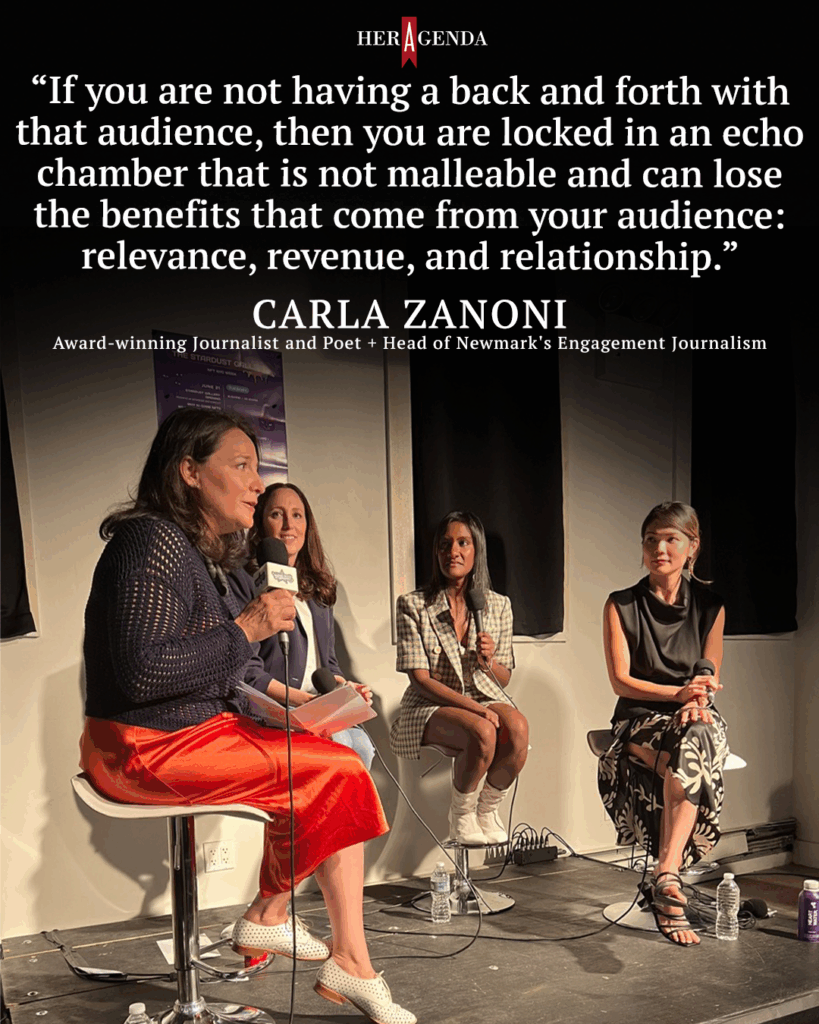
Her Agenda:As Director of the Engagement Journalism program at CUNY’s Craig Newmark Graduate School of Journalism, how do you define engagement beyond clicks and shares?
Carla Zanoni: Engagement journalism is not just about learning what’s relevant in the field today; it’s also about developing a mindset that’s focused on innovation and understanding where journalism is heading.
In the old days, you had a journalist who kind of stood at the top of the mountain, and there was no discussion. It was just: I know what’s best for you. And one of the most important cornerstones of engagement journalism is that it’s a conversation with the audience, a constant back and forth, focused on serving that audience.
Some people have said to me: Isn’t that just what good journalism is? And yeah, I would say that’s what good journalism is. But the reality is that things have not developed in that way. So when thinking about journalistic rigor, we emphasize listening and outreach. I’m not just teaching students how to build an audience; I’m teaching them how to connect with that audience in a deeper and more meaningful way.
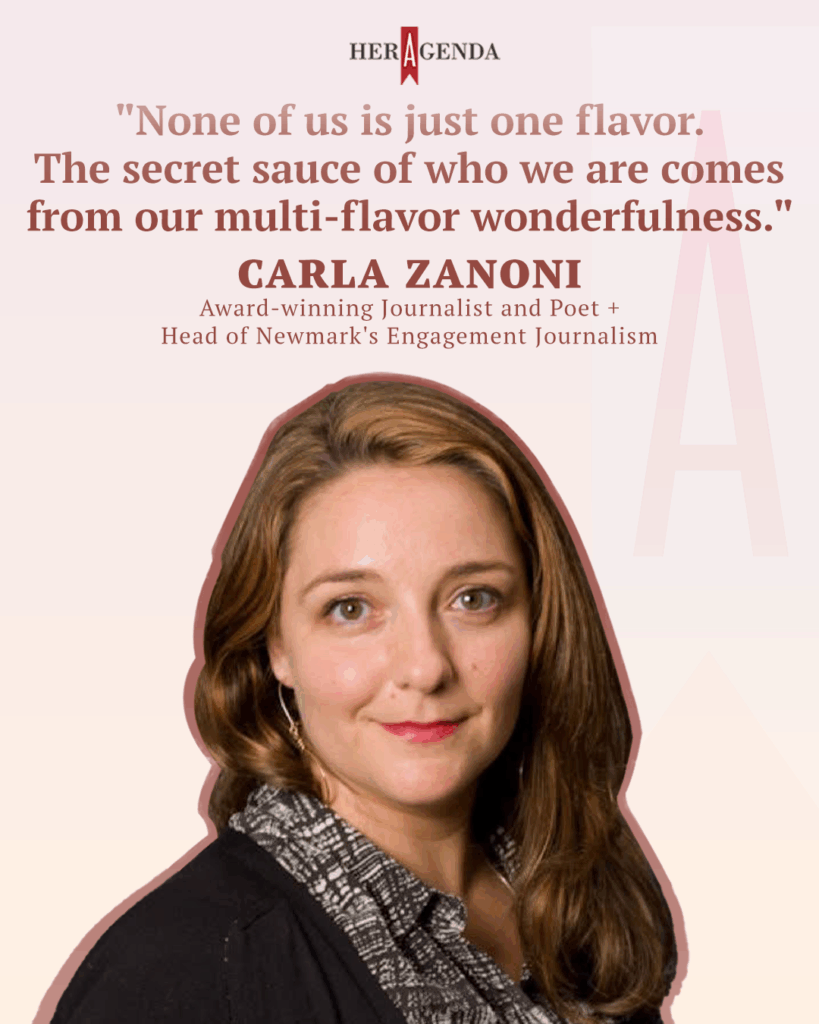
Her Agenda: Your career is deeply rooted in local journalism, from helping launch City and State to running a neighborhood blog spotlighting underreported communities in Washington Heights and Inwood, to being part of the founding team at DNAinfo New York and Chicago. What role do you think local journalism plays in today’s complex media environment?
Carla Zanoni: Local journalism is one of the most important types of journalism that exists. We have gone through many years now of the decline of local journalism and the belief that it’s not that important, but all important change, information, connection, community, comes from a local lens. They say it takes a village, and what is that village but your backyard, your town square? All change happens on the local level and then ripples out.
Her Agenda: You call yourself a “media therapist,” which is remarkably compelling. What are some of the most common emotional or mindset blocks you see media professionals and creators facing? How can they work through those challenges?
Carla Zanoni: When asking different individuals and media organizations what their biggest challenges were, one of the things I kept hearing was: ‘I’m doing all these things: TikTok, Instagram, a newsletter, etc, but I have no idea what I’m doing.’
A lot of them were on the road to burnout, and as somebody who had long struggled with imposter syndrome, I was able to hear them clearly and realize that it wasn’t just about: What should my digital/media strategy be? The core of the issue was fear and insecurity. By slowing down and having authentic conversations, you can cut through that and become more discerning.
Part of what I aim to do in the conversation is inform a mindset that’s open to change. If you’re not someone who builds the muscle to respond to change while knowing who you truly are, as a brand, as an individual, etc, then you will not be ready to respond. You want to be able to respond, not just react. The world moves quickly, and you need to know what your unique value proposition is, what your ethics and boundaries are, and where you already have established loyalty with your audience(s). If you are not having a back and forth with that audience, then you are locked in an echo chamber that is not malleable and can lose the benefits that come from your audience: relevance, revenue, and relationship.
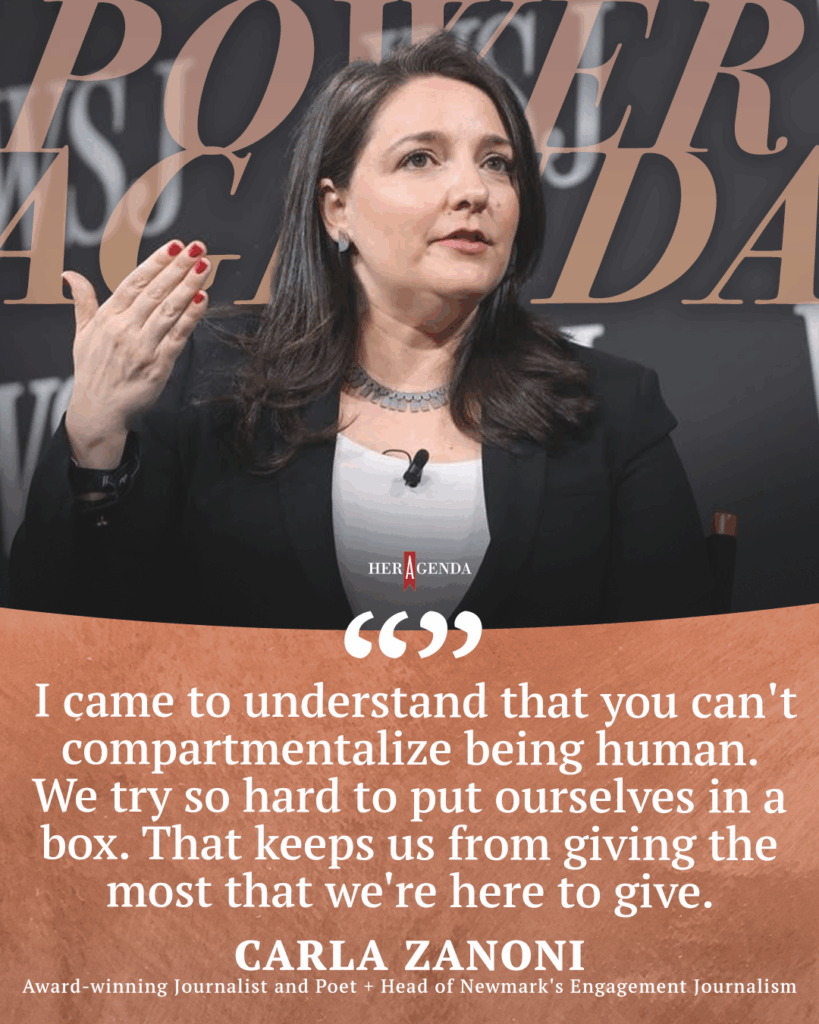
Her Agenda: Given your trailblazing career, your navigation of complex personal and cultural identities, and your work guiding others through emotional and strategic challenges, what’s the most important piece of advice you’d offer to readers who want to embrace their full selves?
Carla Zanoni: A good friend of mine taught me many years ago this saying: ‘Data, not drama.’ After experiencing real loss in my life, this evolved into something much deeper: how do we use data to form meaningful human connections? How do we cut through the drama to get to what’s real, that truth that I’ve been talking about? The numbers tell you what’s working, but your humanity tells you why it matters and how to sustain it. That’s the part that I would want people to take away from this: that it’s not an either-or, lean into the duality. None of us is just one flavor. The secret sauce of who we are comes from our multi-flavor wonderfulness.
[Editor’s note: This interview has been edited for length and clarity.]

